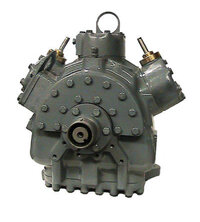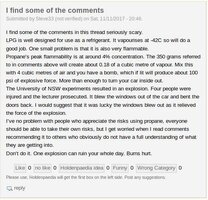- Aug 26, 2012
- 726
My '11 Acadia has a decent a/c temp, but I'd like to try and get it a bit colder. I know I should just check and top off what's needed, but I have been reading on Red Tek's site saying that their refrigerant operates at a lower head pressure, improved cooling properties and requires much less product. [Example]: My Acadia says the a/c specs are 37 ounces, so I will only need 13 ounces of Red Tek to do the job.
http://redtek.com/English/product.asp?ID=26
and...
http://redtek.com/English/product.asp?ID=18
Anyhow, has anyone here used it before?
Did you notice any difference in the a/c output temp compared to other 134a refrigerant brands?
Would there be any difference in fuel economy with lower compressor/head pressure?
If I do this, the plan would be to take the old 134a out and have it recycled, then put a vacuum on the whole system and install the Red Tek with my manifold gauges.
Got into a conversation at my local bar a few nights ago and one guy there mentioned to me that since the Red Tek is flammable, it's quite possible that they're selling regular propane in the 6 ounce cans. And I couldn't really tell if he was joking or not...
http://redtek.com/English/product.asp?ID=26
and...
http://redtek.com/English/product.asp?ID=18
Anyhow, has anyone here used it before?
Did you notice any difference in the a/c output temp compared to other 134a refrigerant brands?
Would there be any difference in fuel economy with lower compressor/head pressure?
If I do this, the plan would be to take the old 134a out and have it recycled, then put a vacuum on the whole system and install the Red Tek with my manifold gauges.
Got into a conversation at my local bar a few nights ago and one guy there mentioned to me that since the Red Tek is flammable, it's quite possible that they're selling regular propane in the 6 ounce cans. And I couldn't really tell if he was joking or not...






